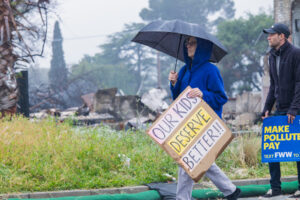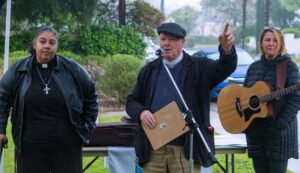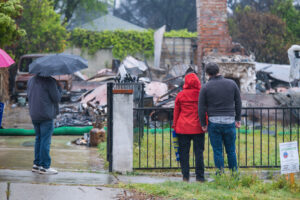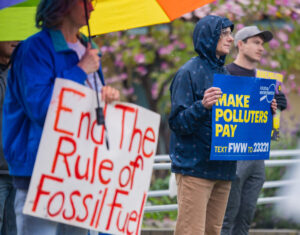The Polluters Pay Superfund act (SB 684/ AB 1243),
designed to make fossil fuel companies pay for their share of climate change related damages, will soon come before the California State Assembly and Senate. The Bishop’s Commission on Climate Change (BCCC) officially endorsed the bill and took part in organizing the May 4 ‘Climate Justice Now’ reflection and rally, in favor of the act.
The rally took place at Altadena’s Christ the Shepherd Lutheran Church as the community recovers from the Eaton wildfire. Organizers decided to hold the rally in Altadena to emphasize the price that the community has paid for climate change — and advocate that companies making money off of fossil fuels are forced to pay their share, said Danial Tamm, BCCC advocacy committee chair and an event organizer.
“Citizens have paid so dearly and tragically, in loss of life, people dying, being killed by this, losing homes, losing lifestyles, losing communities of faith, losing businesses, and the incredible financial cost of this, the deeply damaging financial cost,” Tamm said. “It’s time for those who are making a profit by the burning of fossil fuels to return some of that profit to the state climate super fund, just in fairness, to distribute some of their profits back to the people they’ve harmed.”
Christ the Shepherd survived the fire, but around 80% of the congregation lost homes, Tamm said. Other faith communities represented at the rally included St. Mark’s Episcopal Church, Altadena, Masjid Al Taqwa, and Pasadena Jewish Temple and Center, all of which were destroyed by the Eaton fire.
“One of the most clear signs of the strength of our human community is how we came together after the shock, trauma, and even PTSD from these fires,” said Marry Ann Harrison, pastor at Christ the Shepherd, at the event. “It will take a long time to heal… But while so many are suffering, the corporate polluters responsible for so much of this go on with their lives.”
The rally was initiated by Los Angeles Faith and Ecology Network, of which Tamm is also chair of the steering committee, with collaboration from the BCCC as well as other groups. Tamm said that organizers invited “environmental groups, resistance groups, and other communities of faith and conscience,” to collaborate on the event in order to build a coalition.
The Rev. Danial Tamm Speaks at the May 3 rally. Photo by Evan Clark.
The rally began with a period of reflection including a silent walk through Altadena, followed by speakers, including leaders from different impacted faith communities and Maya Golden-Krasner, of the Climate Law Institute, a member of the team writing the Polluters Pay act bill. Finally, participants shared in a communal meal at Christ the Shepherd.
“We have watched as our community has come together, banded together, and that’s what communities of faith are all about,” said the Rev. Paula Walker of St. Mark’s.
From Masjid Al Taqwa, Jihad Abdus-Shakoor, who is chair of the Masjid’s Crisis and Recovery Committee, also spoke of community coming together at the interfaith gathering: “The community wraps their arms around you and, with their support, you’re able to keep going. That’s the silver lining of all of this. Seeing everyone come together.”
If the bill passes, the California EPA will conduct a study to identify the cost associated with climate change in California. Large fossil fuel polluters would then have to pay a fee proportional to the fossil fuel emissions they were responsible for between 1990 and 2024, which would go into a fund which will be used, as designated by the EPA, for adapting to climate change and mitigating its impacts, addressing climate-fueled disaster response, and investing in climate-resilient recovery efforts. A minimum of 40% of funds will be directed towards disadvantaged communities.
Tamm relayed a story shared by Golden-Krasner: as she was working on writing the bill the night of January 7, she looked up to see nearby trees catching fire. She got out, and her home survived, but she is still unable to move back, Tamm said.
Tamm, as well as the broader BCCC, encourage advocacy for the bill. In difficult times, Tamm said, it’s hard to feel like individuals have any power or control. But, he said, “especially now, we do have in our power to express what it is we want our government to do. And we want to state unequivocally that our changing climate is our responsibility and not our responsibility alone, but those who are making a profit by the burning of fossil fuels, and they need to share some responsibility. So we can reach out to our legislators and say, please, stand up to the oil and gas industry. Stand up to the fossil fuel industry, and don’t let them bully you. Vote yes on polluters pay climate Superfund act.”
Tamm recommends that those who wish to support the bill call and meet with legislators who have not yet said they support the bill, get elected officials, organizations, and businesses to sign on in support of the bill, reach out to influential constituents who may be able to directly contact legislators, and sign up for phone banking sessions through Food and Water Watch, here.
The Polluters Pay action packet includes scripts which can be used or adapted for emailing and speaking with senate or assembly members, tools to locate your state senate and assembly district, as well as bill details, provided by advocates for the bill.




